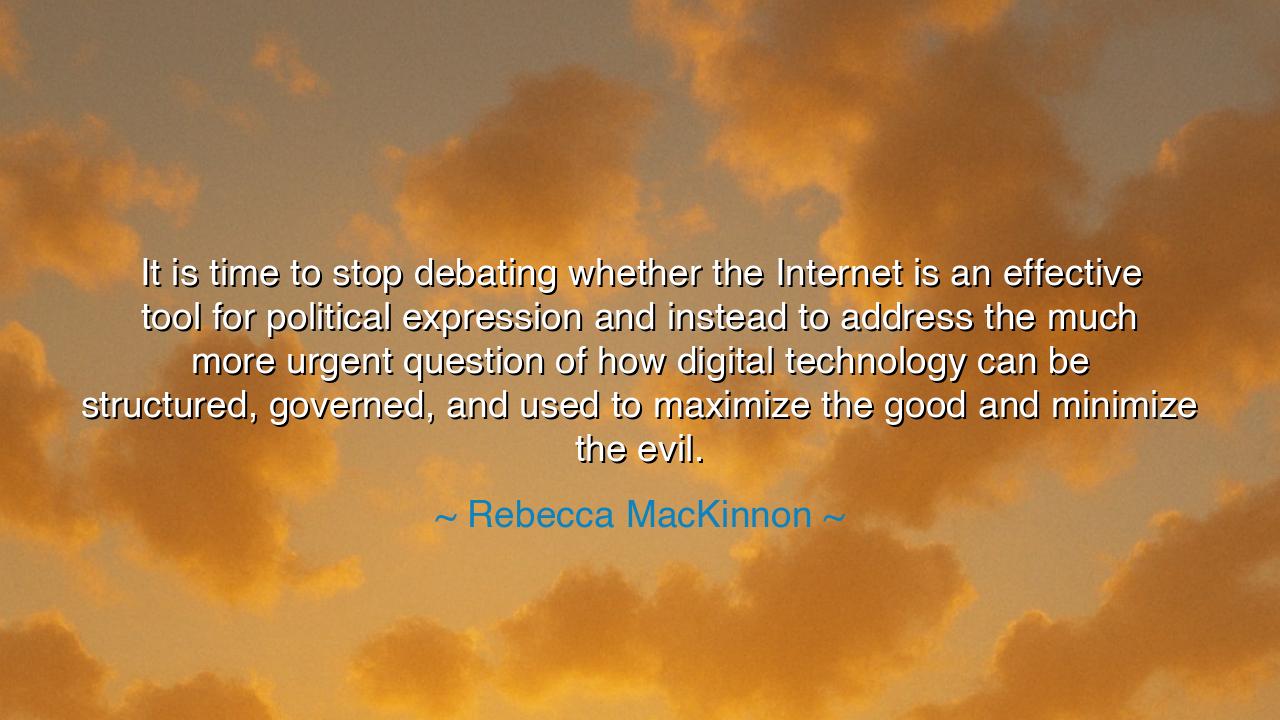
It is time to stop debating whether the Internet is an effective
It is time to stop debating whether the Internet is an effective tool for political expression and instead to address the much more urgent question of how digital technology can be structured, governed, and used to maximize the good and minimize the evil.






Hear, O children of the digital age, the voice of Rebecca MacKinnon, who hath spoken with clarity of vision: “It is time to stop debating whether the Internet is an effective tool for political expression and instead to address the much more urgent question of how digital technology can be structured, governed, and used to maximize the good and minimize the evil.” These words ring as a trumpet-call across our time, for they demand that we lift our eyes from idle debates and confront the true challenge: how to wield the greatest tool of communication humanity hath ever known.
Mark this truth: the Internet is no longer a question of possibility—it is reality. It hath already changed how men speak, how they gather, how they revolt, and how they dream. From the smallest village to the greatest city, the web of light connects the voices of millions. The time of questioning its power hath passed; now remaineth only the question of how that power shall be guided—toward light or toward shadow. For a sword, once forged, cannot be unmade, but it may be wielded wisely or foolishly.
Consider the tale of the Arab Spring, when ordinary men and women used the Internet to share their cries for freedom. Through social media, they broke the silence of oppression, spreading their voices beyond the reach of their rulers. In Tunisia, in Egypt, in Libya, the digital word became a spark that set nations aflame. This was the Internet as a tool of political expression, mighty and undeniable. Yet also, in those same days, falsehoods, manipulation, and surveillance crept like serpents into the same networks. Thus was revealed the double-edged nature of digital technology—capable of liberating the oppressed, but also of binding them with chains unseen.
So too in other ages: when Gutenberg’s printing press first spread across Europe, it broke the monopoly of knowledge. The common man could read scriptures and ideas once held by kings and clergy. Revolutions of thought were born, and empires trembled. Yet that same press also spread lies, propaganda, and division. The lesson is the same: every tool that magnifies the human voice magnifies both truth and deceit, both hope and hatred. Therefore, MacKinnon’s words remind us that our task is not to deny the tool, but to structure and govern it so that the balance leans toward good.
Mark also this wisdom: to maximize good and minimize evil is no passive act. It requireth vigilance, laws that protect without suffocating, communities that resist tyranny and manipulation, and individuals who act with integrity. Without governance, the Internet becomes a wild field where wolves devour the sheep. Without freedom, it becomes a cage where speech is strangled. The challenge of our age is to hold these forces in balance, creating a realm where truth may flourish without handing unchecked power to the few.
The lesson is plain: idle debate about whether the Internet is powerful is as foolish as debating whether fire is hot. Its power is proven; the question is how to master it. Therefore, each of us must ask: do I use this tool to spread wisdom or folly, kindness or cruelty, freedom or oppression? And as societies, we must demand structures that restrain corruption and protect dignity. For the future shall be shaped not by the existence of digital technology, but by the manner in which we govern its use.
Practical is this counsel: be mindful of the words thou sendest into the web, for they ripple farther than thou knowest. Support leaders, laws, and communities that value transparency, accountability, and human dignity in the digital realm. Question not whether the Internet matters—it doth—but how thou and thy people shall make it a servant of justice rather than a master of deceit.
Thus remember the call of MacKinnon: “Stop debating…and instead address how digital technology can be structured, governed, and used to maximize the good and minimize the evil.” This is the task of our generation, the stewardship of a power greater than fire or iron. If we succeed, we shall leave to our children a world connected by light and truth. If we fail, we shall leave them chains of invisible steel. The choice is ours, and the time is now.






AAdministratorAdministrator
Welcome, honored guests. Please leave a comment, we will respond soon